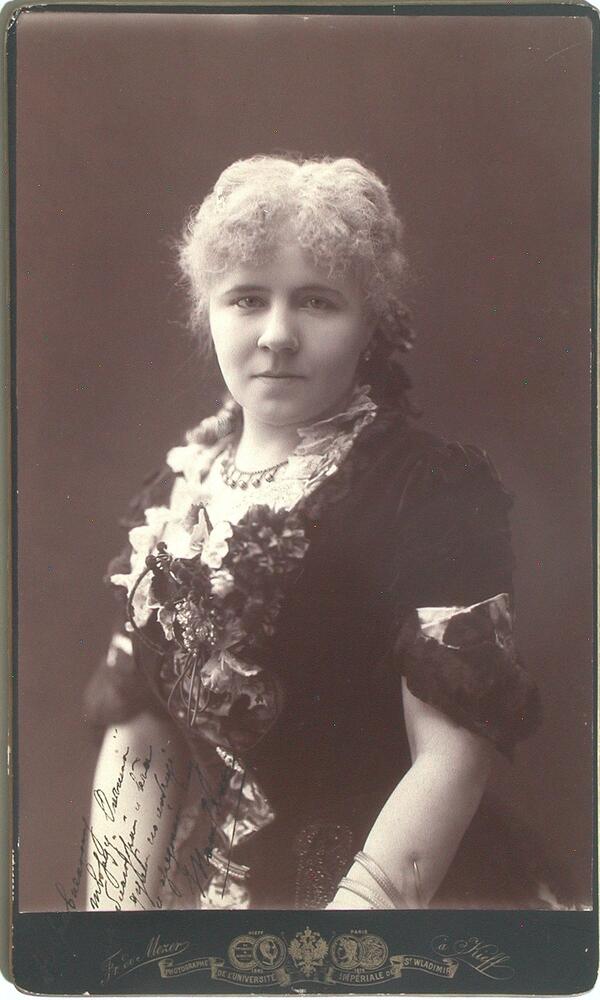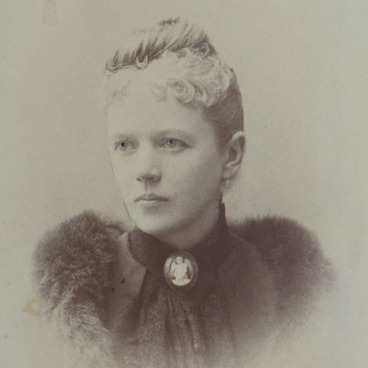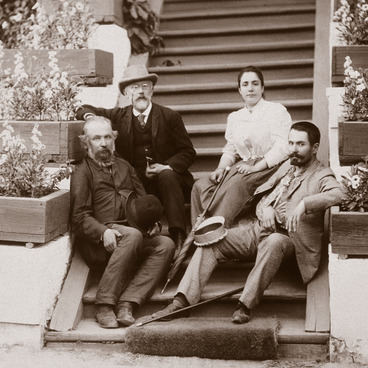This is a photograph of EmIlia Pavlovskaya, a Russian opera and chamber singer (soprano), vocal coach, and pianist. Emilia studied at the Saint Petersburg Conservatory, under Professor Camille Everardi. She debuted professionally in Malta with an Italian company.
Pyotr Tchaikovsky got acquainted with Pavlovskaya’s work in 1877 when Kyiv’s public favorite was singing in La Traviata. Their face-to-face meeting, however, took place several years later. In 1883–1884, Pavlovskaya was a lead singer at the Bolshoi Theater, where she played the role of Tatyana in the opera Eugene Onegin. She met Tchaikovsky during the rehearsals.
Eugene Onegin was a big success. Emilia later recalled Tchaikovsky kissing her hands and saying: ‘I would never have thought that my music could turn into something quite like that’. That marked the beginning of their true, long-term friendship.
In 1884, Tchaikovsky’s new opera — Mazeppa, based on Pushkin’s 'Poltava' poem — premiered at the Bolshoi Theater. Emilia Pavlovskaya played the role of Maria who is in love with Mazeppa. The day after the premiere, Tchaikovsky wrote to the singer: ‘A big thank you to the one and only Maria for the exceptionally wonderful performance’. While Tchaikovsky was alive, critics considered Pavlovskaya’s interpretation of the role the best one.
In 1885, she played Tatyana in Eugene Onegin on the new stage at the Mariinsky Theater. Two years later, also in Saint Petersburg, she played the role of Kuma in The Enchantress. Although the opera was conducted by Tchaikovsky himself, it was quite coldly received by the public and removed from the repertoire after 12 performances.
The composer considered Emilia Pavlovskaya a very talented opera singer. In his letters, Tchaikovsky called her “my benefactress” and admired her skills. They remained close friends throughout their lives. Tchaikovsky always held Pavlovskaya’s opinion in high regard. She wrote in her memoirs: ‘Eugene Onegin and my interpretation of Tatyana made Tchaikovsky and myself very close; I was a part of his life, a part of all of his plans and work’. In 1892, Emilia Pavlovskaya retired from stage performances and took up teaching.
Pyotr Tchaikovsky got acquainted with Pavlovskaya’s work in 1877 when Kyiv’s public favorite was singing in La Traviata. Their face-to-face meeting, however, took place several years later. In 1883–1884, Pavlovskaya was a lead singer at the Bolshoi Theater, where she played the role of Tatyana in the opera Eugene Onegin. She met Tchaikovsky during the rehearsals.
Eugene Onegin was a big success. Emilia later recalled Tchaikovsky kissing her hands and saying: ‘I would never have thought that my music could turn into something quite like that’. That marked the beginning of their true, long-term friendship.
In 1884, Tchaikovsky’s new opera — Mazeppa, based on Pushkin’s 'Poltava' poem — premiered at the Bolshoi Theater. Emilia Pavlovskaya played the role of Maria who is in love with Mazeppa. The day after the premiere, Tchaikovsky wrote to the singer: ‘A big thank you to the one and only Maria for the exceptionally wonderful performance’. While Tchaikovsky was alive, critics considered Pavlovskaya’s interpretation of the role the best one.
In 1885, she played Tatyana in Eugene Onegin on the new stage at the Mariinsky Theater. Two years later, also in Saint Petersburg, she played the role of Kuma in The Enchantress. Although the opera was conducted by Tchaikovsky himself, it was quite coldly received by the public and removed from the repertoire after 12 performances.
The composer considered Emilia Pavlovskaya a very talented opera singer. In his letters, Tchaikovsky called her “my benefactress” and admired her skills. They remained close friends throughout their lives. Tchaikovsky always held Pavlovskaya’s opinion in high regard. She wrote in her memoirs: ‘Eugene Onegin and my interpretation of Tatyana made Tchaikovsky and myself very close; I was a part of his life, a part of all of his plans and work’. In 1892, Emilia Pavlovskaya retired from stage performances and took up teaching.



